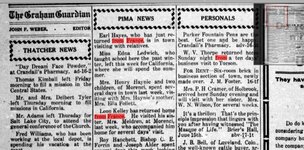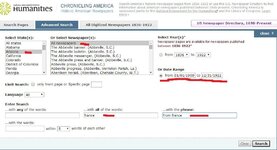UncleMatt
Bronze Member
- Jul 14, 2012
- 2,389
- 2,531
- Detector(s) used
- Garrett Infinium & Gold Bug II, Bazooka Super Prospector Sluice
- Primary Interest:
- All Treasure Hunting
Hey ALL,
Lets say you are researching a treasure legend in the interior of the United States, and discover someone had come to the treasure area looking for it in the past in the early 1900's. Further, lets surmise these people had connections with those who lost or buried the treasure back in the day, and that they came from European countries, like France or Spain. You have no names to work with at all, only the years they visited, and their country of origin.
Now then, do any of you think it would be possible to track down those people who came from the countries in question through immigration records? Or shipping records? or any other form of records the layman would have access to today? It would require you to start with a very large pool of names, and then through the process of elimination reduce them to the final names. (if that is even possible)
I'm curious, were foreigners in the first half of the 1900's required to disclose what US state was their destination? Of course, many people entered the country without being recorded, but if they came by ship from Europe, one would think there would have been records as they passed through customs.
Looking for informed input on this please. Yes, I know its a long shot. Just tell me if you think it could be done or not, and your reasoning or evidence behind your position.
Lets say you are researching a treasure legend in the interior of the United States, and discover someone had come to the treasure area looking for it in the past in the early 1900's. Further, lets surmise these people had connections with those who lost or buried the treasure back in the day, and that they came from European countries, like France or Spain. You have no names to work with at all, only the years they visited, and their country of origin.
Now then, do any of you think it would be possible to track down those people who came from the countries in question through immigration records? Or shipping records? or any other form of records the layman would have access to today? It would require you to start with a very large pool of names, and then through the process of elimination reduce them to the final names. (if that is even possible)
I'm curious, were foreigners in the first half of the 1900's required to disclose what US state was their destination? Of course, many people entered the country without being recorded, but if they came by ship from Europe, one would think there would have been records as they passed through customs.
Looking for informed input on this please. Yes, I know its a long shot. Just tell me if you think it could be done or not, and your reasoning or evidence behind your position.







